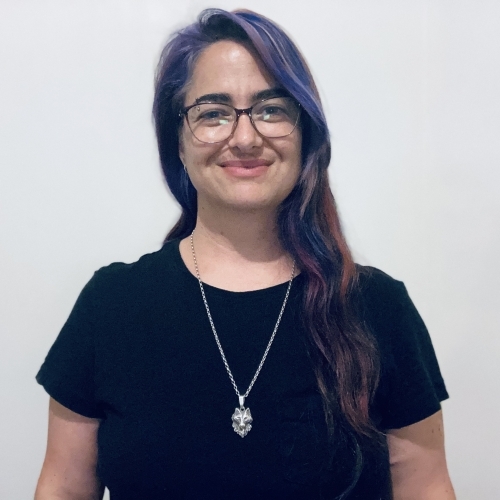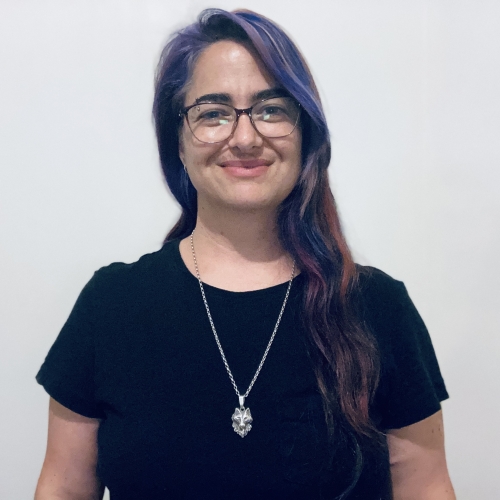
Monica Seeber
Murdoch University
Monica Seeber is an aspiring polymath and has a Bachelor of Arts (honours) majoring in philosophy from The University of Western Australia and a Master of Arts in professional writing from Deakin University. She is in her final semester of the Bachelor of Science at Murdoch University, majoring in mathematics and statistics with a secondary major in philosophy.
Her research interests include mathematical realism, models of time, and folk philosophy – that is, philosophical ideas proposed by non-academics who aren’t explicitly trying to “do philosophy”. As a professional writer Monica specialises in proofreading technical documents and translating texts into Plain English. She enjoys all fields of mathematics, including statistics, but is especially fond of calculus and its applications.
Monica is eager to pursue interdisciplinary postgraduate research in mathematics and philosophy, investigating how philosophy of mathematics influences individual and social attitudes about mathematics.
Can you give me a quick overview of the type of mathematics you are studying and its potential applications or outcomes?
My research focus is on the philosophy of mathematics and the assumptions hidden behind our approach to learning, teaching and applying mathematics.
Field maps visualise a subject as a physical space and make explicit the ‘areas’ of knowledge within that subject and the relationships between them. Existing field maps of mathematics are organised the objects of mathematics (i.e. numbers, sets, functions) and visualise the relationships between the sub-specialties of mathematics that study them. However, mathematics is a human discipline that is practiced by humans using human tools; it is a practice and a process as well as a body of knowledge.
I want to create a new field map of mathematics that is organised around the subject of mathematics: people. This field map would visualise mathematics as it exists in the human world – how it is learned, applied, and investigated – explicitly within the context of the humans practicing mathematics. It would traverse human cognition, perception and bodily experience, mental and physical environments, and personal and social practices.
My hope is that this new perspective of mathematics will enable people to see mathematics as a dynamic social enterprise that anybody can understand and everybody can appreciate.
How did you get into the mathematical sciences?
After my philosophy degree, I spent some time working as a digital copywriter. The internet is driven by numbers, and IP addresses are only the beginning. User metrics, audience demographics, and return on investment are all numbers and I – a copywriter – was swimming in them. I wasn’t just writing words, I was collecting statistics, analysing algorithms, and optimising publishing schedules. I thought breaking down statistics was fascinating; maximising search engine rankings was interesting; and coordinating the logistics of digital content production was fun. I was doing maths! And I liked it! I wanted to know more about the maths behind the work I was doing so, naturally, I enrolled in a mathematics degree.
You received a scholarship to attend AMSI Summer School 2022. How important was this in terms of your ability to attend, fully participate in the program and meet others studying in similar fields?
I would not have been able to attend without the scholarship.
The purpose of Summer School is to give students an opportunity to develop their mathematical skills, meet like-minded people and network with potential employers. What was the most valuable part of the program for you? Was it the course content or the people you met? Do you have new ideas for your work/research or see it in a new light?
I appreciated the opportunity to study areas of math that are of personal interest to me but not available at my home university. I also enjoyed ‘meeting’ lecturers from other universities and learning about their research. The subjects I studied are related to my VRS project and I’m tempted to go back and extend it using what I learned at summer school.
Summer School included a special Careers Day program which aims to help give students an idea of the kinds of career paths available to maths graduates in industry and private sector research areas. Were you previously aware of the types of industry opportunities available to mathematical science graduates? Would you consider working with industry? Do you feel better equipped to explore career options in the mathematical sciences after attending AMSI Summer School?
I would love to work in any field that allows me to apply the skills and knowledge I gained through my math degree. I’d attended several ‘careers days’ before the summer school day and after a while they get a little repetitive. I found some of the information only applies to people living on the east coast of Australia (or who are in a position to relocate) and that was quite frustrating. Mostly I thought it was ‘too little, too late’. There are a lot of graduate programs that I’d be very interested in applying to however they run from January to December and you often have to apply 12 months in advance; I needed that information in second year, not when I was on the verge of graduating.
I would also appreciate practical information like how to present specific examples of my skills and experience from my degree when addressing selection criteria or writing cover letters. i.e. how do I describe my statistical competencies for somebody in HR that will also convince a technical specialist that I can do the job?
AMSI Summer School was held as a virtual event. What was the biggest positive from your point of view holding it in this format and/or the biggest challenge?
The virtual formal allowed me to attend; I’m not in a position to travel interstate for a month for an in-person event. The timetabling was a challenge – 7am is just too early for differential geometry. The weekly changes made it difficult to develop a good routine – just as I’d adapted to the schedule it would change and I missed some classes because I had my weeks mixed up.
Studying in isolation is very difficult; it would have been good to have people to discuss the material outside of class time. Trying to assimilate that volume of information in such a short period of time was overwhelming at times.
What advice would you give to someone who is considering applying for Summer School in 2022? Should they apply and why?
Just do it. Who doesn’t want to hang out with a group of math nerds for a month?
Where do you want the mathematical sciences to take you? Where do you see yourself in five, ten years time?
I want to work in research and academia, particularly in the intersection of mathematics and philosophy. After I revolutionise the philosophy of mathematics I’d really like to figure out the meaning of 0÷0.
Any other comments you would like to provide on the AMSI Scholarship or AMSI Summer School 2023?
Requiring scholarship applicants to pay the fee upfront is not very accessible. The cohort of students you’re encouraging to apply by offering scholarships are unlikely to be in the position to loan AMSI $500 for several months. There has to be a better way that doesn’t discriminate against students with poor cash flow.

